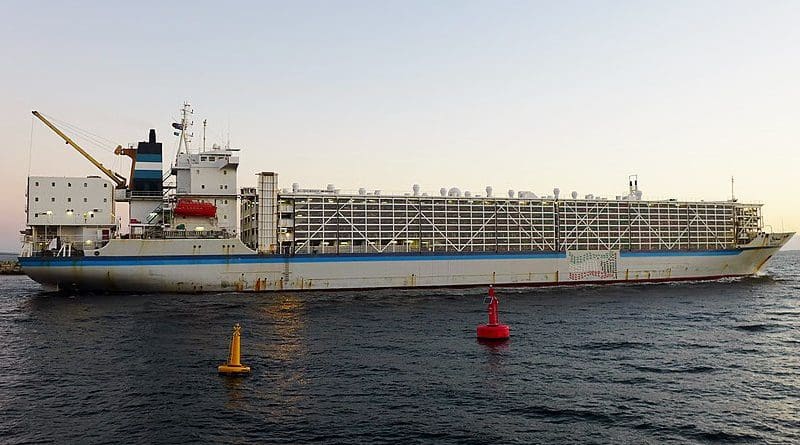Spain Declines EU Parliament’s Invitation To Clear Livestock Ship Affair
By EurActiv
By Gerardo Fortuna
(EurActiv) — The Spanish government has rejected a request to speak before the European Parliament’s inquiry committee (ANIT) about issues related to live transport of animals, according to documents seen by EURACTIV.
The invitation referred to controversial events involving two livestock ships that departed from Spanish ports in mid-December, bound for Turkey and Lybia.
Turkish authorities rejected 800 cattle carried by the Lebanon-flagged ship Karim Allah, and 1,800 cattle on the other, Togo-flagged, Elbeik livestock carrier over suspicions of the bluetongue virus.
Although an outbreak amongst the bovines was not confirmed, the two ships had been stranded at sea as they were not allowed to dock at any port after the Turkish refusal.
Both ships wandered in the Mediterranean for months, ending their journey in Spain, where the government ordered the slaughtered of the unwanted animals.
At the end of April, the chair of the Parliament’s ANIT committee, the Green MEP Tilly Metz, invited Spanish Agriculture Minister Luis Planas to exchange views with European lawmakers in a meeting to be held on 25 May.
The Spanish government replied in a mail seen by EURACTIV that, due to the minister’s work schedule commitments in May, it would be impossible for him to participate in the meeting.
However, the invitation was open to a substitute representative from the Spanish agriculture ministry, in case Planas was busy that day.
In the reply mail, Spaniards reiterated their willingness to collaborate with the ANIT committee but without giving a representative to speak on behalf of the government, offering instead the possibility to answer in advance some questions to be raised at the meeting.
The government also attached a report in Spanish – previously sent to the EU’s Health Commissioner Stella Kyriakides – with detailed information and conclusions drawn about what happened to the livestock carriers.
In the report, seen by EURACTIV, the Spanish government said that the circumstances that had led to the wandering of the ships were “rare and very exceptional.”
“The legislator will have to assess in the future whether some exceptions are necessary (without prejudice to the maximum protection of animal health), but in the meantime, the only possible action to be taken in the event of a refusal and return to EU territory is the euthanasia of the animals,” the document reads.
According to the Spanish, both the previous and the current EU animal health legislation do not allow the re-import of live animals rejected by third countries which have not previously authorised their export.
Contacted by EURACTIV, the ANIT chair Tilly Metz expressed her regrets that Spain has declined repeated invitations for an exchange with the members of the inquiry committee.
“Declining this invitation is a weird signal for a member state to send to a parliamentary committee representing EU citizens and it is even weirder considering that one of the co-rapporteurs of the inquiry committee is from Spain,” she said.
The ANIT committed is expected to deliver a final report on the current situation regarding the protection of animals during transport, in order to determine whether there has been maladministration of EU law so far in this field and to issue possible recommendations for the future.
“However, to properly fulfil this mandate, we rely on the good faith and cooperation of member states,” Metz concluded.
Spanish representatives did not reply to EURACTIV’s requests for clarification on the government position by the time of publication.

